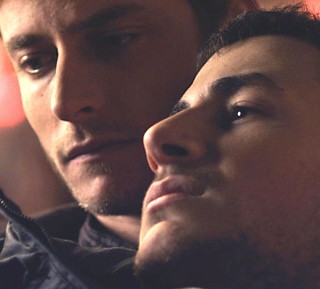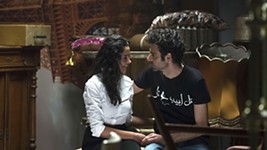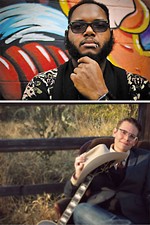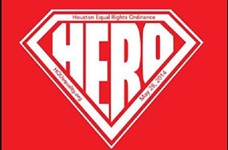The Austin Jewish Film Festival Reaches Out
From homophobia to 'Hava Nagila,' these 21 features cross boundaries and borders
By Andy Campbell, Fri., April 12, 2013
The 11th annual Austin Jewish Film Festival, which kicks off Saturday, April 13, is a bit of a balancing act.
For Jewish film festivals, the historic and ongoing Israel/Palestine conflict is a large, unwieldy, and politically tricky subject; American Jewish communities, especially in liberal enclaves like Austin, are not monolithically supportive of Israel's every move. Within such an audience-specific context, films which honor complexity and moral ambiguity fare better. Complicating matters is the fact that the AJFF straddles the Israeli secular holidays of Yom Ha'atzmaut, commemorating the 1948 Israeli Declaration of Independence, and Yom Hazikaron, the day of remembrance for fallen Israeli soldiers. Each of these days is feted with a special screening, and recent Austin transplant and Israeli actor Alon Pdut will speak at the festival about his experiences as the son of an Israel Defense Forces soldier who died when he was only 5 years old. Pdut says that "this fact is probably connected to why I became an actor. Being an actor is all about this insane need for love."
AJFF audiences will be able to see Pdut onscreen as well, as he plays the single-minded and homophobic Shin Bet baddie Gil in Michael Mayer's debut feature, Out in the Dark. In this narrative film, love is proposed as the cobweb between law and psychology, which is fitting because the two protagonists, Roy (Michael Aloni) and Nimr (Nicholas Jacob) – both unfairly, disarmingly handsome – are an Israeli lawyer and Palestinian psychology student, respectively. Their relationship begins on one of those late-night alcohol-fueled bar jags; gestures of woozy attraction and lust issue forth inside flashing interiors and on patchy fluorescent-lit streets. Except instead of the dot dot dot of a one-night stand, the evening is cut short with the practicalities of Nimr's inevitable journey back to Ramallah.
Such stories are now staples of both Israeli and Palestinian filmmakers alike and prone to a kind of cliche flatness – "Nimr, Nimr, wherefore art thou?" Out in the Dark is as much about clashing class positions (a Guess Who's Coming to Dinner?-esque scene with Roy's well-heeled upper-middle-class parents is telling) as it is about national identities. And though the tacit focus on Israel's acceptance of LGBTQ people as a signal of a subsequent acceptance of all people (known colloquially as pinkwashing) is a real concern in surveying Israeli cinema, any claim that Out in the Dark was representative of such a trend would need to contend with Gil's penchant for the word "faggot" and the blatant racism of Roy's parents. Says Pdut of his approach to such an antagonistic character, "Something that the director and I talked about was the fact that he is really homophobic, and perhaps that's because he himself is homosexual." At the same time, it was liberating to play a character so different in constitution from the actor's own. "I'm usually a pretty nice guy, not that tough or scary. I'm a 40-year-old father, and so if I feel aggressive I go to the gym, and so it was awesome to play the bad guy." Those seeking an easy resolution to the competing familial/national/sexual relations should look elsewhere, as, luckily, Out in the Dark provides no such comfort.
Not everything at this year's Jewish Film Festival is so serious – Roberta Grossman's Hava Nagila: The Movie delivers on its title's promise. The documentary is a romp through every Jew's favorite-slash-least-favorite wedding song that no one ever seems to know the words to. Brisk and light, Hava Nagila: The Movie never spends too long without panning back to Jews dancing to the titular song – why, oh why, my people, have we no rhythm? Or James Freedman's Glickman, which traces the protean sportscasting career of Marty Glickman – inventor of such sport bon mots as "swish." He was loved for the musicality of his broadcasting style, but admirers may not know that Glickman was banned from the 1936 Olympics for being a Jew. That particular Summer Olympics is a flashpoint in this year's program, as evidenced by Berlin 36 (Kaspar Heidelbach), a based-on-a-true-story narrative drama regarding the German-Jewish high jumper Gretel Bergmann. Elsewhere, Eytan Fox's Yossi, a follow-up to his 2002 military-romance Yossi & Jagger, revisits the anguished cardiologist.
Rounding out the festival is the genre-mashing The Ballad of the Weeping Spring (Benny Toraty), which is sure to please nearly everyone who sees it – as evidenced by the fervent sponsorship by no less than four Jewish community organizations. Yosef Tawila (played by the remarkable Uri Gavriel) carries his lute slung across his shoulder, as a cowboy might sling a gun, and gathers together his former bandmates to play a final concert before one of their brethren dies. The film was shot in Israel, but the music and costume design imply a fusion of place. It's a fitting film for the AJFF, because it not only sets music at the heart of a story, but also gathers together sometimes-competing interests to play in a chord.
The 11th annual Austin Jewish Film Festival runs April 13-19 at the Regal Arbor at Great Hills (9828 Great Hills) and City Lights Theatre (420 Wolf Ranch Pkwy., Georgetown). For schedules and ticketing information, visit www.austinjff.org.











